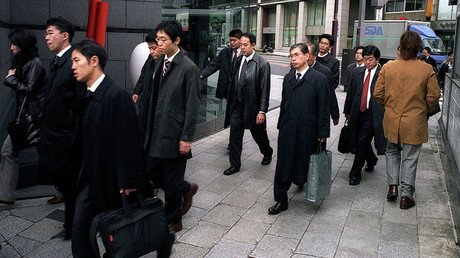Remote workers at risk for more stress, insomnia - UN study

No aggravating commute, no annoying office mates. What's not to like about telework? Higher levels of stress and sleep disruption compared to office workers, according to a United Nations labor study.
For its newly-released report,"Working anytime, anywhere: The effects on the world of work," the UN International Labour Organization gathered data from 15 nations regarding the impact of technological advancement that has allowed increasingly more laborers to work remotely.
Thanks to "expanding use of digital technologies," telework can increase productivity, offer more flexibility and allow laborers to avoid commuting to an office, among other benefits, the UN report said.
As telework becomes more prominent, so has the need to disconnect in order to separate paid work and personal life: https://t.co/zB6OzwFU3ipic.twitter.com/KbexvkU7RX
— ILO (@ilo) February 15, 2017
However, remote-worker data analyzed by the UN found that working from home or working from various locations away from a fixed office can also often lead to "longer working hours, higher work intensity and work-home interference."
The study made a distinction between three types of workers: those who regularly work from home, "high-mobile" employees that consistently work from various locations outside an office and those who work in both an office and off-site.
All of these groups were found to have higher stress and more bouts of insomnia than those who regularly or always work in an office or other fixed, employer-owned site, the study reported.
Forty-one percent of highly-mobile workers reported stress as opposed to 25 percent of office workers, the study found.
Meanwhile, 42 percent of highly-mobile and regular home workers said they dealt with insomnia, as opposed to 29 percent of regular office workers.
"This report shows that the use of modern communication technologies facilitates a better overall work-life balance but, at the same time, also blurs the boundaries between work and personal life, depending on the place of work and the characteristics of different occupations,"said Jon Messenger, of the UN International Labour Organization and co-author of the report.
To improve on the negative impacts of telework, the report suggested that such workers be given opportunities to maintain bonds with their co-workers and that employers should restrict informal and supplemental telework that demands long hours.
As technology has advanced, so have opportunities for telework around the globe, though there is no indisputable metric for counting regular teleworkers. In 2014, 2.6 percent of the American workforce were considered regular telecommuters by the American Community Survey, the New York Times reported.
A 2015 Gallup poll found that 37 percent of US workers reported telecommuting at some point in the past.
The nations analyzed in the study include 10 European Union countries – Belgium, Finland, France, Germany, Hungary, Italy, the Netherlands, Spain, Sweden and the UK – as well as Argentina, Brazil, India, Japan and the United States.
Among the countries involved in the study, telework "varies substantially, from 2% to 40% of employees, depending on the country, occupation, sector and the frequency with which employees engage in this type of work," the report said, adding that an average of 17 percent of workers in the European Union engage in telework.
In response to the rise of telecommuting, nations are addressing some of the negative impacts outlined by the report. For example, in France, a new labor code provision calls for "the right to be disconnected," the report highlighted, in order to curb "work without end." In 2013, Germany's Ministry of Employment "introduced a ‘minimum intervention in leisure time’ policy, whereby managers can contact employees outside of their normal working hours only to deal with exceptional situations requiring action that cannot be postponed until the start of the next working period," the report said.
















